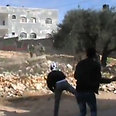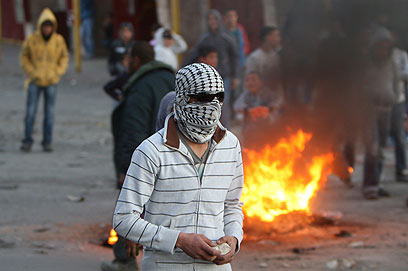
IDF seeks to clarify rules of engagement
Military aims to meet soldiers' demand for clear guidelines for engaging rioters in West Bank, following troops' complaints that their 'hands are tied'
Soldiers serving in the West Bank complained in recent days that "their hands are tied" vis-à-vis Palestinian rioters in the sector, due to the military's orders to exercise maximal restraint.
Related stories:
- Watch: Palestinians, IDF forces clash in Naalin IDF defends restraint policy
- Watch: Palestinians stone IDF soldiers
The directives came under scrutiny over several incidents, where soldiers had to flee rioters rather than engage them due to ambiguous orders.
The new directives, a copy of which was obtained by Ynet on Wednesday, aim to clarify the rules of engagement; and while they stress the need for caution and discretion, they clearly state that soldiers are allowed to open fire in the event of an imminent threat.
Amongst other things, the document states that, "During foot patrols, when soldiers identify that Israeli vehicles are being stones, constituting clear and present danger, they must fire to eliminate the threat using static or single shots only, without endangering other vehicles."
In cases involving Molotov cocktails thrown at troops, the soldiers are ordered to "Fire at the source until the threat is neutralized."
"When on foot patrol, if protesters stone our forces, massively and physically endangering soldiers, suspect engaging procedures must be put into effect in full, culminating with aiming the weapon at the assailant's lower extremities. However, if the stoning poses no true physical threat the arrest should be conducted using reasonable force."

Clashes in the West Bank (Photo: EPA)
The document clearly stated that should IDF troops come under gunfire, they must respond by returning fire at the source and engaging any suspects.
Directives pertaining to fire protocols in checkpoints – both permanent and temporary ones – have also been clarified further.
The new orders also focus on vehicular terror attacks, i.e. – incidents when terrorists attempt to run soldiers over: "Should a directed attempt to run soldiers over be made and it cannot be thwarted, troops must engage in suspect arrest procedure and they may fire at the car. But should there be any doubt or any chance that the incident is accidental, the soldiers must hold their fire. Once the vehicle no longer poses a threat, the soldiers must hold their fire."
A senior GOC Central Command source explained that "So far the containment and restrain policy has proven itself as preventing incidents from escalating. These orders all derive from battle ethics.
"We must exercise discretion and keep live fire as the last resort. We don't want to shoot indiscriminately and harm innocent people and if something like that happens we immediately offer assistance.
"Had we opened fire on every teenager that rioted during Operation Pillar of Defense it would have spilled into the West Bank ."
Itamar Fleishman contributed to this report
- Receive Ynetnews updates directly to your desktop











